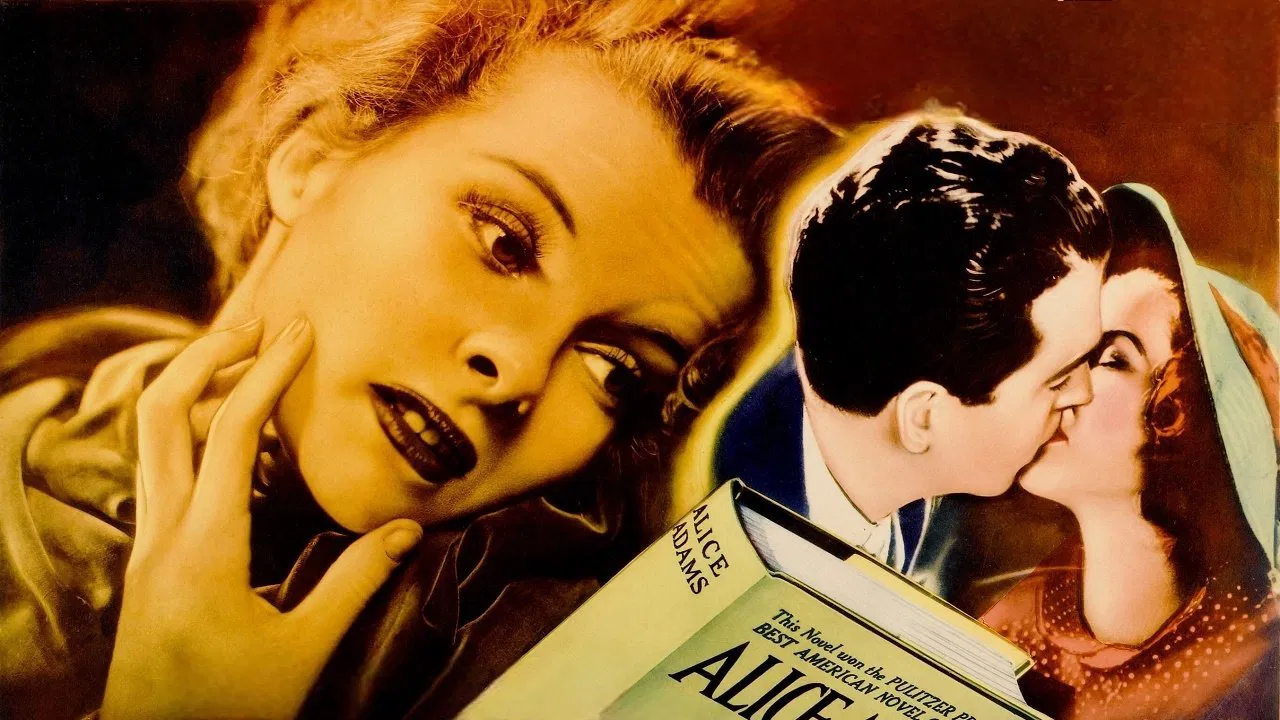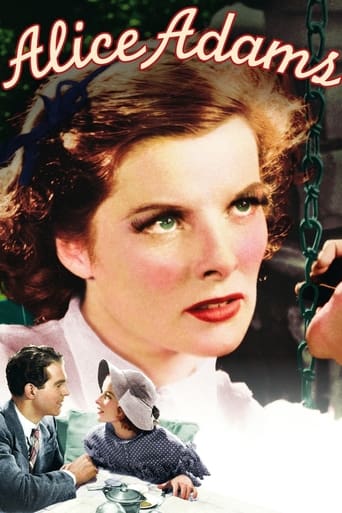

I should start by noting that I've never read Booth Tarkington's novel on which George Stevens's Academy Award-nominated "Alice Adams" is based; hell, I'd never heard of Tarkington until I saw the movie. I don't know whether or not the novel would've biased me, but on its own, the movie comes across as kind of fluffy (especially considering that it stars the usually sassy Katherine Hepburn). Kate plays a woman whose efforts to hide her family's poverty turn awkward.I'd say that the most significant thing about the movie is the race relations. Without a doubt the movie has a dated focus on race relations. But one thing to address is the mother's disappointment in the son's willingness to associate with African-Americans. How many white people would've associated with non-white people back then? It seems that whether the relations are between white people and black people or poor people and rich people, tension will arise.Overall, it's worth seeing for Kate's performance, but it's not a great movie. The rest of the cast includes Fred MacMurray, Frank Albertson (the business partner in "Psycho"), Charley Grapewin (Uncle Henry in "The Wizard of Oz") and Hattie McDaniel (Mammy in "Gone with the Wind").
... View MoreGeorge Stevens directed this adaptation of the Booth Tarkington novel about a social climbing mother (Ann Shoemaker) and daughter (Katharine Hepburn, in the title role). Hepburn and the film were Oscar nominated.Alice is a small town girl whose brother (Frank Albertson) is "forced" to take her to a society party, hosted by Mildred Palmer (Evelyn Venable, who's parents are played by Hedda Hopper and Jonathan Hale), in their dumpy automobile. There she meets the wealthy Arthur Russell (Fred MacMurray), who she thinks is "attached" to the hostess. Though she's embarrassed by her brother (found gambling with the hired help) and later their shabby home, Alice has intrigued Arthur with her plain, simple, self-deprecating nature and he begins to pursue her. He invites Alice to another party, hosted by her father's employer J. A. Lamb (Charley Grapewin), but she's too embarrassed to accept. Alice's mother, upset by this, shames her husband Virgil (Fred Stone), who's been recovering from a long illness, into getting off his butt to better provide for their family.Virgil decides that the glue formula he invented while working for Lamb is his, and goes into business for himself. This leads to an obvious conflict between himself and his "former" employer, who'd been supporting him through his illness. Her father's newfound success and "wealth" enables Alice to feel comfortable enough to be courted by Arthur, and invite him to their home for dinner. Mrs. Adams hires a cook-servant (Hattie McDaniel) for the occasion and, in an hilarious scene, all does not go as planned. Evidently, one can't "buy" class;-) However, a happy ending is (of course) a foregone conclusion.
... View MoreSmall Town U.S.A. has its society, and desperate to be a part of it, lower middle class girl Katharine Hepburn crashes it every chance she gets. Her mother (Ann Shoemaker), even more social climbing than her, sends Hepburn with her very uninterested brother (Frank Albertson) to an upper class soirée where she meets the handsome Fred MacMurray and begins putting on airs to make herself something she is not. This film, based upon a 1920's Booth Tarkington story set before the depression, was a late depression era look at how one family faced despair (certainly not with much dignity), but it is obviously not Alice's fault, something we learn from watching her with her seemingly lazy papa (Fred Stone in a brilliant performance) who is constantly being browbeaten by his wife. Evelyn Venable and Hedda Hopper represent the upper class versions of Hepburn and Shoemaker who look on them as sort of necessary evils, simply because they've lived around them all of their lives and basically have no choice. Stone reveals his character's true values in a scene with his former boss ("The Wizard of Oz's" Charley Grapewin) that will truly make you empathize with him over being part of such a ridiculous clan.In a long dinner party scene where Shoemaker and Hepburn desperately try to impress MacMurray, the always funny Hattie McDaniel allows herself to play a stereotypical low-class version of her usual black maid as she slowly shuffles back and forth, chewing gum, and dealing with a maid's cap that keeps slipping down her face. McDaniel represents the true pretentiousness of the Adams family as Shoemaker's rash hiring of her (simply because she's black!) leads to possible humiliation. This scene gives the impression that the film is a screwball comedy, but really it is a sad observation about how the lower middle class was trying to rise above being themselves.The stair set of the employment agency she goes to is a memorable visual, listing every profession they are offering inside. The Adams family home too is also quite striking, its front door much grander than the financial situation of the family, as is the set for Stone's non-working glue factory. What could be a rather ordinary story of eccentrics and their phoniness ends up exploring the turn-around of its heroine who finally wakes up when she finds real love and realizes that she doesn't need to be anyone but who she is. At first Hepburn's extremely chatty Alice is really annoying (or "rayley" as she always seemed to pronounce it in her early films) but that slowly dissipates as she meets and falls in love with the wealthy but really down-to-earth MacMurray.
... View MoreALICE ADAMS (RKO Radio, 1935), directed by George Stevens, from the 1922 novel by Booth Tarkington, is a charming story about a middle-class family of a quaint little town: Virgil Adams and his wife; son, Walter, and most of all, their daughter, Alice. Previously filmed during the silent movie era in 1923 starring Florence Vidor, this new edition with Katharine Hepburn offers her a role unlike anything she's done before, a sensitive portrayal of a girl longing to be accepted by others, but going about it the wrong way. Set in South Renford, "a town with a future," Alice Adams (Katharine Hepburn) starts off the story entering a flower shop to buy a corsage for a social function she's planning to attend. Unable to afford it, she goes about picking withering violets in the park instead. Without having a new dress to wear and no young man to take her, she has her brother, Walter (Frank Albertson), a compulsive gambler, to act as her escort. Mrs. Adams (Ann Shoemaker) who wants the best for her children, particularly Alice, places the blame for her daughter's setback on her husband, Virgil (Fred Stone). Virgil, a career clerk for Mr. Lamb's (Charley Grapewin) company, taking extended sick leave from his job, is loved and understood by Alice, while he's constantly nagged by his wife, and for good reason. Mrs. Adams feels the glue formula he and another partner (now deceased) had invented years ago, rightfully belongs to Virgil and not to his employer. As for the party at the Palmer household, Alice meets Arthur Russell (Fred MacMurray), a young man who takes an special interest in her in spite of he being "practically engaged" to hostess and socialite, Mildred Palmer (Evelyn Venable). During their courtship, Alice does her best to make a good impression, but her pretense reveals the fact how ashamed she is of her family and background. Through the suggestion from her mother, Alice reluctantly agrees to invite Arthur over for dinner, hiring their neighbor, Melena Burns (Hattie McDaniel), to pose as their maid, with disastrous results.For its simple-minded story and excellent character study, there's no question that ALICE ADAMS earned great success with critics and audiences alike. For her performance, Hepburn earned a second Academy Award nomination, whose character is observed to be childish, talkative and with a wild imagination. In spite of these qualities, she's determined to succeed professionally as well as socially. In order to make good in her accomplishment, Alice needs to accept herself for whom she is rather than pretending to be someone she isn't. George Stevens, in his first important directorial assignment, brings forth several situations providing the effectiveness of the story as well as its characters. For the Palmer party sequence, for example, Alice sits alone, pretending to be enjoying herself while the guests are gathered amongst themselves, making Alice feel and realizing how much of a social outcast she is. Stevens allows the camera to show off her inner thoughts through facial expressions and numerous close-ups, especially while dancing with the clumsy Momma's boy, Frank Dowling (Grady Sutton). Quite touching is Alice's returning home from the party as she walks upstairs, enters her bedroom, giving out her inner frustration through crying while standing with her face touching the window with the rain outside pouring down as the expression of her tears. Another scene worth noting is the dinner sequence. Set on the hottest day where Alice, her parents and their guest, Arthur, with sweaty foreheads, struggling to act comfortable in their proper dinner clothes while Melana (McDaniel), enacting her part as their gun chewing maid, getting most of the attention more for her mannerisms than for her speaking. Though much of the film offers a recurring score that could relatively be classified as "The Alice Adams Theme Song," this ten minute dinner sequence alone contains no underscoring, yet, quite effective as it is leisurely paced. Fred MacMurray, on loan-out assignment from his home studio of Paramount, enacts his Arthur Russell in a good-natured manner. He accepts Alice for what she is, but is only too polite to be blunt and honest about how she's really hurting herself. Fred Stone, a veteran stage actor with limited screen roles to his credit, plays the role as the homespun father to near perfection. He brings forth the best of his portrayal in a realistic manner during his confrontation with his employer, Mr. Lamb, after learning how his son embarrassed him by stealing $150 from the company. Stone's performance might have earned him a supporting actor's award had that category existed with the academy in 1935. Others in the cast are equally good, including Jonathan Hale and Hedda Hopper as Mildred's parents; Virginia Howell as Mrs. Dowling; and Ella McKenzie as Ella Dowling, all in smaller roles.Distributed to home video by Nostalgia Merchant or the Turner Company back in the 1980s, and later on DVD, ALICE ADAMS, formerly presented on American Movie Classics prior to 1998, can be seen whenever shown on Turner Classic Movies. (****)
... View More